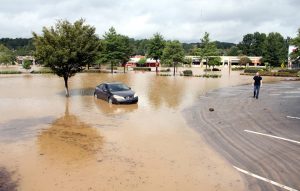The strategic use of data is everywhere in the field of Public Administration. For public service leaders to be effective in the modern era, the skills to collect, analyze, report, and operationalize data are essential. In an article in Public Administration Times entitled “Data Insights Lead to Better Public Administration,” Bill Brantley writes, “good policy analysis has always relied on data and statistical analysis to understand policy issues and formulate appropriate policy responses.” He also points out that “our ability to collect data” has changed and that we have more tools and more capacity to collect data than ever before. The federal government is currently working an overarching data strategy with a goal to “leverage data as a strategic asset to grow the economy, increase the effectiveness of the Federal Government, facilitate oversight, and promote transparency.”

Word Cloud prepared by the author.
With that in mind, the MPA program at UNC requires coursework in data analysis. All students take a data-driven Research and Analysis class each semester of their first year in the program. Another required course, Organizational Theory, gets into the topics of performance management and strategic planning. Students can also dig deeper into data with electives in topics like performance management, productivity, decision analysis, and benchmarking.
Earlier this week our student ICMA chapter invited UNC MPA alumni Monica Chaparro and Josh Edwards to discuss their professional experience with data and strategic planning in local government. Monica is the Program Manager of Strategic Planning and Performance Management in the Budget Department in the City of Raleigh and Josh is the Assistant Budget Director of Strategy and Performance as well as the Director of the Innovation Team for the City of Durham.
Reflecting on her UNC MPA experience, Monica shared that “David Ammon’s Productivity in Local Government class coupled with Maureen Berner’s program evaluation class piqued my interest in the intersection of data and strategy. Beyond piquing my interest, those classes equipped me with the foundational skills I needed to flourish in my first job, which involved managing the Balanced Scorecard for one of the City of Charlotte’s largest departments.” Josh had a similar comment, adding, “whether I am working on building data capacity in my organization, helping a department develop key performance measures, or analyzing data to help improve city services, I am thankful for how well Professor Berner, Professor Ammons, and Professor Morse helped develop my analytical toolkit at the MPA Program.”
Current MPA student and Wake County Budget and Management Intern Aaron Brown is also very interested in the intersection of data and strategy. He is taking Performance Management with Professor Rivenbark because it brings together data analysis and strategic planning. Aaron thinks that strategic planning is key because “I want my data analysis to matter.” He told me that he believes public service leaders can use data to give them a “tangible direction” and can help measure progress on “real goals that you can reach out and touch.”



 This day has been coming for a while! It kept creeping up on us here at UNC, as we were finalizing new fall admissions for both our on-campus and online formats, and we were busy registering our returning students, taking our vacations, and working hard to prep for the academic year amid the quietness of the MPA hallway. Quick fact, our MPA program at UNC houses about 170 students who are currently enrolled!
This day has been coming for a while! It kept creeping up on us here at UNC, as we were finalizing new fall admissions for both our on-campus and online formats, and we were busy registering our returning students, taking our vacations, and working hard to prep for the academic year amid the quietness of the MPA hallway. Quick fact, our MPA program at UNC houses about 170 students who are currently enrolled! 